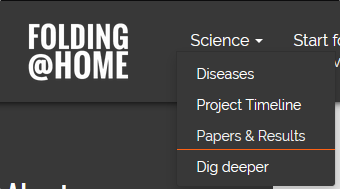@AB2000
1) Yes, the world has trusted hardware and dedicated bandwidth. That's not the point of @home projects. Protein folding and @home projects at a whole are particularly suited well suited to highly distributed computing with only needed synchronization being a few uploads/downloads a day. You don't need a highly engineered super computing architecture for something this asynchronous. Not to mention that folding@home is currently
more powerful than the top 7 supercomputers combined. Actually, the network is has
doubled in power since that article and is now more powerful than the combined power of the top 100 supercomputers
2a)
There are several organizations which fund our work:
Most notably, a large bulk of our funding comes from the United States’ National Institutes of Health (NIH) and National Science Foundation (NSF). We also thank (in alphabetical order) Apple, ATI, Dell, Google, Intel, and Sony for their support over the years. Finally, we have been supported by NIH Roadmap centers Simbios and the Protein Folding Nanomedicine Center
Folding@home was started at Stanford's Pande Laboratory. It was and remains a research project.
Funding from Stanford:
"Internet 2 program, the Office of Technological Licensing, and an award of a Terman Fellowship to Prof. Pande."
Involved institutions:
[ul][li]Washington University in St. Louis[/li]
[li]Memorial Sloan-Kettering Cancer Center[/li]
[li]Temple University[/li]
[li]HKUST[/li]
[li]Notre Dame[/li]
[li]University of Virginia[/li]
[li]Stockholm University[/li]
[li]Colorado State University[/li]
[li]CSULB[/li]
[li]Mediterranean Institute for Life Sciences[/li][/ul]
Sources:
https://foldingathome.org/about/the-foldinghome-consortium
https://foldingathome.org/about/partners
2b) Google
could divert resources from free services (which would disclude obligations such as Google Compute Platform and various B2B services), but
would you really want them too? Especially NOW?
3a) Some parts such as the frontend are
opensource but that not what you're asking is it? F
@H was and is lead by academics who's careers and reputation built over the course of decades of hard work, would be in danger if they were secretly using the project for even some
other research purpose. Not to mention the massive publicity of the project and what how kindly the federal government take to a such a scandal. And in this case, open sources
3b) The
statistical nature of protein folding gives a powerful useful tool to guard against bad results and bad actors. Which also brings up a question of not just means but motives
4)
@Indigo, already linked to the easy to find page
5) Do you have any idea how scarce US funding is?
This doesn't even have anything to do with tax payments, it's a donation of resources. Temporary and at-will lending if you discount
energy consumption.
A medical project asks for people to contribute resources to study disease and you're complaining that
during a pandemic they have the audacity to ask for resources to fight said pandemic?!


